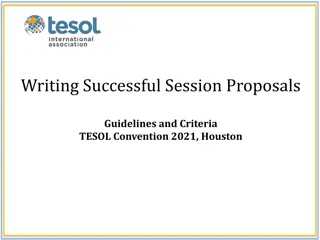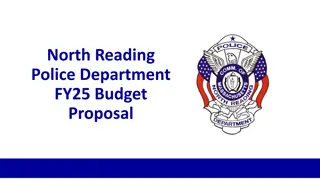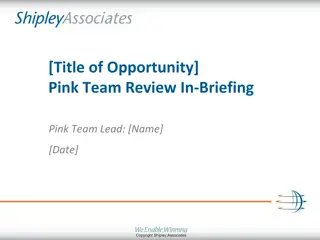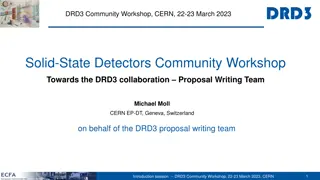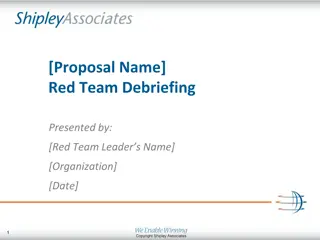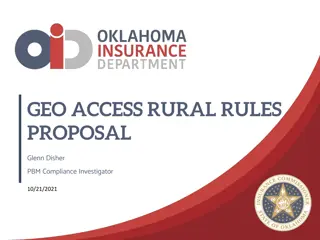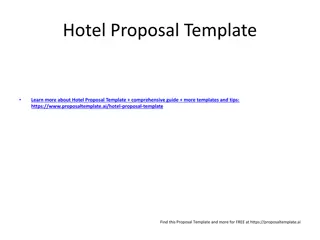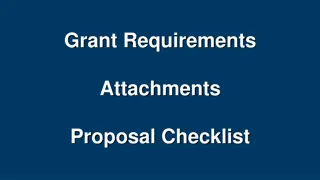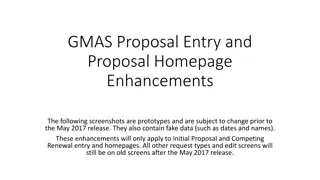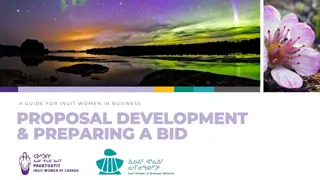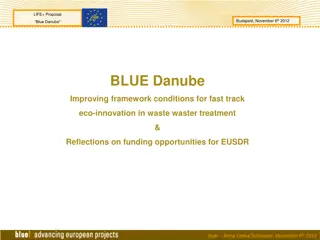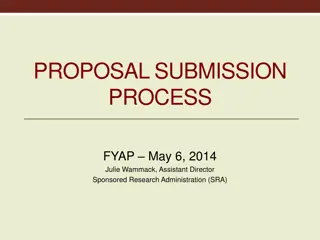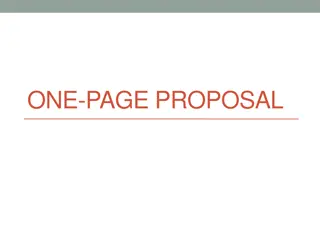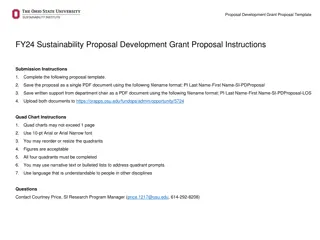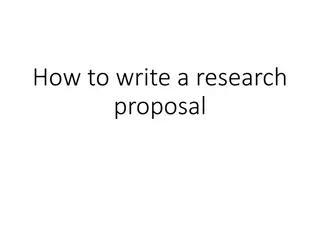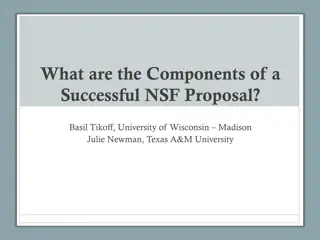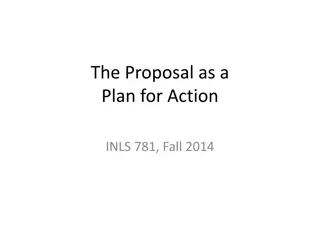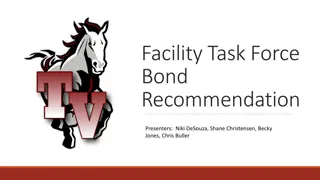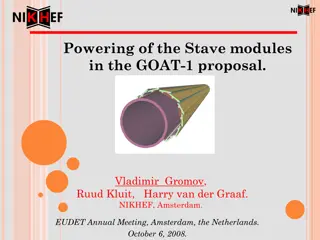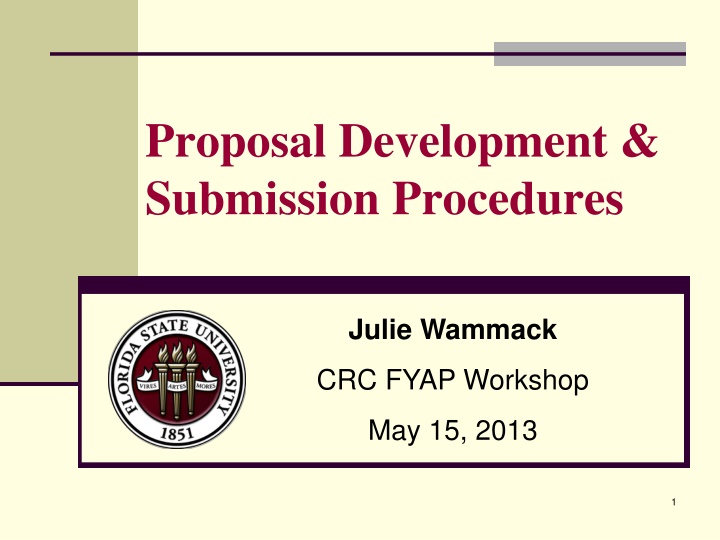
Proposal Development and Submission Procedures for Research Funding
Learn the essential steps for developing and submitting a research proposal for funding. Find the right funding match, review agency documents, prepare the proposal, and submit it through Sponsored Research Services. Establish a working relationship with administrators, review all proposal documents carefully, and follow submission guidelines to increase your chances of success.
Download Presentation

Please find below an Image/Link to download the presentation.
The content on the website is provided AS IS for your information and personal use only. It may not be sold, licensed, or shared on other websites without obtaining consent from the author. If you encounter any issues during the download, it is possible that the publisher has removed the file from their server.
You are allowed to download the files provided on this website for personal or commercial use, subject to the condition that they are used lawfully. All files are the property of their respective owners.
The content on the website is provided AS IS for your information and personal use only. It may not be sold, licensed, or shared on other websites without obtaining consent from the author.
E N D
Presentation Transcript
Proposal Development & Submission Procedures Julie Wammack CRC FYAP Workshop May 15, 2013 1
Steps for Proposal Development/Submission Find funding that matches your research interests/needs Read the agency documents funding solicitation, agency guidelines, etc. Prepare proposal Obtain institutional approvals Submit the proposal to Sponsored Research Services (SRS) 2
Contact Sponsored Research Services (SRS) ASAP Establish a working relationship with the administrator who will process your proposal Administrator provides agency-specific expertise Questions about the proposal process can be answered 3-day submission policy Documents needed for SRS PI Responsibilities/SRS Responsibilities 3
Review ALL Proposal Documents Funding Announcement: Request for Proposal (RFP), Program Solicitation, Request for Application (RFA), Broad Agency Announcement (BAA) Application Instructions Agency Guidelines All these documents provide information pertinent to your proposal The instructions/guidelines must be followed or you risk the proposal being returned without review for non-compliance. 4
Request for Proposal (RFP) Program Description Eligibility (Limited Submission?) Funding Limits Deadlines Due Dates for Submissions Submission process electronic? Hard copy? Review/Evaluation Criteria Award Description Award Administration Reporting requirements, etc. 5
Natl Endowment of the Humanities Challenge Grants Deadline 5/1/13 Capacity-building grants, intended to help organizations secure long-term improvements in and support for their humanities programs. Institutions that support research, education, preservation, and public programming in humanities disciplines are eligible to apply for an NEH challenge grant; institutions may apply for only one NEH challenge grant in a calendar year. Federal portions of NEH challenge grants have ranged from $30,000 to $1 million; typical award is $425 - $500K Successful applicants will be offered a matching grant; recipients must raise three times the amount of federal funds offered Grant funds may not be used for recovery of indirect costs Applicants are encouraged to submit a preliminary draft of the full narrative section of the application 4-6 weeks before application deadline. . . 6
Prepare the Proposal Application Download the application forms from the agency website or upload the proposal documents for grants.gov, FastLane or other sponsor-specific electronic submission systems Check with the SRS to see if they handle any of the required forms Complete forms in the application and attach required items Most proposals include the following: Abstract, Project Narrative, Budget, Budget Narrative, Biosketch, Current/Pending Support, etc. 7
Standard NSF Grant Application Project Summary 1 page Project Description (narrative) 15 pages Budget/Justification (3 pages) References Biosketches 2 pages specific format Current/Pending Support Facilities/Equipment Data Management Plan Postdoc mentoring plan if requesting support for a postdoc 8
SRS Internal Documents Transmittal Form Scope of Work Budget Budget Justification plus - All other agency-required documents NOTE: Proposal must be submitted to SRS in ready-form for submission 9
Transmittal Form (SRS Internal Form) Funding Announcement/Request for proposal (RFP) or solicitation number Proposal due date and submission type Name of PI/Co-PIs, other personnel and departments involved Amount requested and project performance period Distribution of the indirect costs between the participating departments Special commitments Items that may need further review or certifications 10
Certifications FSU must provide certain assurances, representations, and certifications when proposals are submitted or when accepting an award Special Certifications may include Animal subjects DNA/RNA use Human subjects Hazardous chemicals Use of the FSU Marine Lab facilities 11
Institutional approvals Attach the entire agency application including the RFP, with the Proposal Transmittal Route to all PI s for signature Route to all associated Chairs and Deans for approval Route to Sponsored Research Services for approval 12
Submitting Transmittal via OMNI OMNI proposal submissions include the same information as a hardcopy proposal submitted with the Proposal Transmittal Form Differences You attach the items electronically in the OMNI system You can route the proposal electronically Advantages You can track approvals electronically No running around Electronic records are available 24/7 13
Submission Policy 3 Day Rule The Vice President for Research instituted a policy effective on February 1, 2006, stating that a proposal must be submitted to Sponsored Research Services (SRS) by 9 am three working days prior to the Agency deadline The PI may work on the technical narrative until 9 am on the day of submission SRS needs ample time to review the proposal and institutional commitments Subcontracts or collaborations are also subject to this rule 14
Sponsor Deadline Deadline SRS Internal Monday Tuesday Wednesday Thursday Friday the previous Wednesday at 9 A.M. the previous Thursday at 9 A.M. the previous Friday at 9 A.M. Monday of the same week at 9 A.M. Tuesday of the same week at 9 A.M. *Saturday and Sunday are not business days and do not count towards the 3-day rule. You should treat Friday as the deadline, so the internal proposal deadline is Tuesday of the same week at 9 am. *Some agencies move weekend and federal holiday due dates to the next business day but it needs to be verified by the sponsor. 15
What Happens at Sponsored Research Services Review the RFP Review the complete proposal for compliance with the RFP and FSU policies and regulations Review special commitments that are being made Make sure all parties have approved the proposal Check the budget and budget justification 16
Budget Development 1. Direct Cost Categories 2. F&A/Indirect Costs or overhead 3. Cost-sharing 4. C.A.S. exemption items 17
Direct Costs A-21 Direct costs are those costs that can be identified specifically with a particular sponsored project, an instructional activity, or any other institutional activity, or that can be directly assigned to such activities relatively easily with a high degree of accuracy. 18
Indirect Costs - F&A - Overhead Indirect costs are those that are incurred for common or joint objectives and, therefore, cannot be identified readily and specifically with a particular sponsored project, an instructional activity, or any other institutional activity. 19
FSUs Indirect Cost Rates Indirect Cost Rates are applied depending on the following: Type of Agency Location of Project (on/off campus/Mag Lab) Type of Project Solicitation 20
Budget Types of Projects Research A systematic study directed toward fuller scientific knowledge and understanding gained of the subject studied Instruction The teaching and training activities of an institution Other Sponsored Activity This includes programs and projects which involve the performance of work other than instruction or organized research 21
F&A Bases - MTDC Modified Total Direct Costs (MTDC) consists of all salaries and wages, fringe benefits, materials, supplies, services, travel, and subgrants/subcontracts up to the first $25,000 of each subgrant/subcontract MTDC excludes equipment, capital expenditures, charges for patient care, tuition remission, rental costs of off-site facilities, scholarships, fellowships, and the portion of each subgrant/subcontract in excess of $25,000 Typically applied to federally-funded projects 22
F&A Bases - TDC Total Direct Costs (TDC) consists of all direct costs FSU policy - exclude matriculation from F&A base Typically applied to non-federally funded projects 23
Sample Budget MTDC/TDC Base MTD Salaries/Fringe $50,000 Equipment $10,000 Supplies $ 3,000 Publications $ 2,000 Tuition Total Direct $77,529 MTDC/TD Base $55,000 Indirect Costs $28,215 Total Requested $105,744 TD $50,000 $10,000 $ 3,000 $ 2,000 $12,529 $77,529 $65,000 $ 6,500 $84,029 $12,529 24
Cost Sharing Costing sharing or matching is that portion of project costs not borne by the sponsor. A cost sharing commitment means any cost sharing included and quantified (e.g., % of effort and/or dollar amount) in the proposal budget, proposal narrative or award document. The award document may incorporate the commitment directly or by reference to the proposal. Project enhancement means describing "resources that are available" for the project but are not quantified in the proposal budget, narrative or other documents. This is not considered a cost sharing commitment. 25
FSU Cost Sharing Policy The policy of the University is to make a cost sharing commitment only when required by the sponsor or by the competitive nature of the award and then to cost share only to the extent necessary to meet the specific requirements of the sponsored project. If a PI requests an exception to this policy, the department Chair and Dean must approve. The VPR approval is required, also. Cost sharing is approved at the proposal stage. 26
NSF Cost Sharing/IDC Rates January 2011, NSF instituted a policy prohibiting cost sharing January 2013, NSF requires institutions to use the indirect cost rate(s) negotiated with the cognizant negotiating agency. All organizational resources necessary for the project (both physical and personnel) must be described in the Facilities, Equipment and Other Resources section. The description should be narrative in nature and must not include any quantifiable financial information. 27
Personnel Salaries & Wages Include faculty, technicians, post-docs, graduate students*, & other personnel who are assigned to the project NOTE: for federal projects, administrative & clerical personnel normally fall within the indirect costs category and cannot be charged as direct costs *grad students receive a salary supplement for health insurance 28
Fringe Benefits Faculty/A&P/USPS Retirement; Health Insurance; Social Security & Medicare Worker s Comp & Unemployment OPS Students* Worker s Comp & Unemployment (Grad students - salary supplement for health insurance) OPS Non-students* Medicare; Worker s Comp & Unemployment Terminal Leave Pool *We are encouraging PIs to include funds for the new class of OPS health insurance for all new proposals. 29
Consultants Outside individuals with expertise and skills that will add value to project Costs are usually listed in terms of daily rate Consultants are typically paid in the form of a subcontract Consultants never listed in the salaries & wages section and faculty & other FSU staff should not be listed as consultants 30
Equipment Items costing $5,000 or more with a useful life of 1 year or more Items costing below $5,000 are considered materials/supplies and should be identified on that line Equipment should be detailed in the budget justification Equipment requests should only include those items needed to complete the project
Equipment A-21 (3) "Special purpose equipment means equipment which is used only for research, medical, scientific, or other technical activities. Examples of special purpose equipment include microscopes, x-ray machines, surgical instruments, and spectrometers. *Can be charged as a direct cost
Equipment A-21 (4) "General purpose equipment means equipment, which is not limited to research, medical, scientific or other technical activities. Examples include office equipment and furnishings, modular offices, telephone networks, information technology equipment and systems, air conditioning equipment, etc. Cannot be charged as a direct cost except where approved in advance by the awarding agency.
Supplies Supplies and materials related to the project Can be listed in budget as broad categories such as glassware, chemicals or art supplies Minor equipment costing < $5,000 NOTE: For federal projects, routine office supplies are normally treated as an indirect costs (paper, pencils, post-it notes, etc.) 34
C.A.S. Exemptions In exceptional circumstances it may be appropriate to charge F&A costs directly to a sponsored project. If the nature of a sponsored project requires an extensive amount of administrative and/or clerical support or goods/services significantly greater than the routine level provided by an academic department, then the effort is deemed an exceptional circumstance and such costs can be accounted for as direct costs. An Exemption is REQUIRED to direct charge administrative and clerical salaries and other administrative-type expenses. In addition to meeting definition of exceptional circumstances, costs must be specifically identifiable to a particular sponsored project, be reasonable, allowable and allocable. 35
C.A.S. Exemptions CAS exemption must be approved in advance of charges normally classified as F&A being charged directly to a project at the proposal stage Complete CAS form http://www.research.fsu.edu/contractsgrants/forms.html Submit to Sponsored Research Services for approval NOTE: FSU (SRS) needs to approve the C.A.S. exemption; agency approval is not adequate because FSU is audited on these items 36
Travel Project-related travel is usually allowed and may include trips to collect data, present findings at a professional meeting, meetings with program officers or collaborators, etc. Reimbursement of costs should be consistent with FSU s travel policy Most agencies (and SRS) require a break- down of funds requested, such as airfare, hotels, car rental, etc. 37
Subawards/Subcontracts Represents a collaboration of work by one or more other institutions Costs for subawardee is presented in a separate line item and should include both the subawardee s direct and F&A costs A subaward detailed budget should be included as part of budget justification Subawardee s F&A costs are calculated in accordance with the subawardee s negotiated F&A rate agreement Contractual agreements for services or goods with an outside party are not included in this category 38
Subawards / Subcontracts If a collaboration is proposed we will need the following from each collaborator Letter of commitment from the Sponsored Program Office (not PI) Scope of work for their activities Budget Budget Justification 39
Other Direct Costs This category contains all other proposal costs, i.e., animal per diems, publication charges, graphic fees, matriculation, communications, shipping, etc. NOTE: Postage, local telephone, and memberships are normally treated as F&A costs on federally-funded projects. 40
Matriculation Matriculation costs (minimum of 9 hrs) should be included for graduate assistants supported by the project Graduate Matriculation Rate for 13-14 is $464.04/hr or $12,529 for 27 hours (in-state) If matriculation costs are not included in budget, an alternate source for paying must be identified (waiver 2 or 3 on transmittal form) FSU excludes matriculation from F&A calculations in all proposals 41
Matriculation Multiyear proposals should include a 15% increase in matriculation costs annually Out of state matriculation is not an allowable cost in most circumstances College of Engineering may apply out of state rates to their proposals Certain training grants allow out of state matriculation. Check the sponsor guidelines Fees are not an allowable cost unless applying for a training grant 42
Submission to Sponsor Who is responsible for submission to the agency or sponsor? Hardcopy proposals = PI Electronic proposals = Sponsored Research Services 43
Notice of Intent to Award The proposal has been sent off, and the funding agency has now made a funding decision . . . Congratulations! The agency has recommended funding for your project! Intent to Award may arrive in different forms Letter to PI and/or Sponsored Research Email Funding agency electronic funding mechanism A grant or contract arrives in the mail 44
Agency Award Information This intent to award typically states the following: That your application has been selected for funding Next step requirements of the funding agency Revised budget Scope of work Animal subject protocols Human subjects approvals Revision of time period for project Certifications Anticipated start date of the award NOTE: A grant or contract received in the mail also requires some of the items listed above 45
Additional Information Revised budget or scope of work requested: This typically occurs when a funding agency reduces the amount being funded from what was requested. If the proposed funding is significantly less than the original amount requested, the scope of work should be reduced You will need to work with Sponsored Research Services and your department to obtain the required approvals for your new budget and time commitments to re-submit to the agency 46
Advance Spending Project set up in Advance - internal set-up of a project budget number so work may begin before actual award is received or finished negotiations Request for Advance form can be found on www.research.fsu.edu Implications of an advance Financial Research / Personnel SRS looks at many factors Type of Award (when is the effective start date) Anticipated award date Agency pre-award spending regulations Agency assurance of award Department Guarantee of Advance Request 47
Questions? Sponsored Research Services 850-644-5260 srs@mailer.fsu.edu 48

